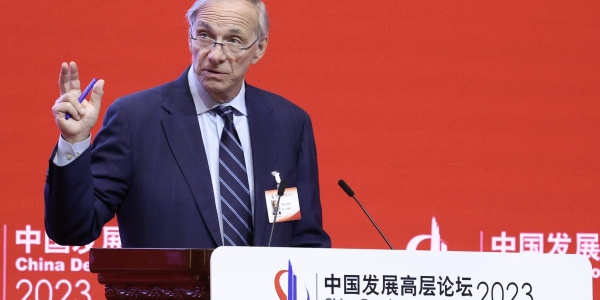
Ray Dalio is worried about U.S.-China relations.
The veteran investor and founder of hedge fund Bridgewater Associates has had close ties with China through investments at his firm. Following a recent 13-day trip to the country, Dalio wrote a LinkedIn post Wednesday reflecting on the state of Sino-American relations.
“For nearly 40 years, I have been going to China,” Dalio wrote. “That has put me in the privileged and awkward position of being deeply attached to the two greatest powers in the world, which are on the brink of going to war with each other.”
Dalio’s Bridgewater has been a big investor in China, with $2.93 billion in holdings there as of January. Its Chinese onshore fund debuted in 2018 and is now the largest foreign hedge fund in the country.
Here’s what he expects in the U.S.-China relations in the coming months.
Pushing the limits of brinkmanship
The U.S. and China are nearing war because of one main problem: communication, Dalio said. The two countries are using sanctions and their militaries to ultimately push the other to cross the “red line” of launching an actual war.
Surprisingly, Dalio recommended against more talk between the two countries. As it is, the more they talk, the more they squabble.
“Discussions about big, important things have become exchanges of accusations that worsen relations rather than help them, so it is worse to have the discussions than to avoid them,” Dalio wrote.
If the U.S. and China continue to instigate one another, it will “irrevocably push them over the brink into some type of war” and hurt the world order, he added.
“U.S.-China relations are getting so bad that there is reason to worry that anti-China sentiment could make doing business with China like doing business with Russia, which would lead U.S.-China trade to collapse,” Dalio wrote.
The billionaire investor criticized President Joe Biden for a lack of decisiveness, especially when it comes to America’s China policy. Dalio also identified other sources of friction between the countries, like China’s provocative military deployments near Taiwan, U.S. restrictions on exporting chips to China, and both countries cutting off access to important technologies from the other.
“All things considered, I think that the greater provocations will most likely come from the American side, which I worry will cause a tit-for-tat crossing of the line,” Dalio said.
Other countries want to avoid the fight for global leadership
In Dalio’s view, leaders in China and in other countries believe America’s domestic problems have tarnished its global image. Other countries no longer aspire to be like the U.S., and foreigners no longer necessarily dream of living there. This is creating global disorder, Dalio thinks. People now view the U.S. as trying to impose its ideas about democracy and capitalism worldwide, he said.
“Some countries believe that while the Americans are trying to draw them into war (especially the Russia-Ukraine war), the Chinese are trying to facilitate peace,” Dalio wrote.
And amid the decline of U.S. global dominance, the world still needs a strong guiding force—and China could be it, except many countries don’t want to pick sides, according to Dalio.
“The fight for global influence is well underway, and great splits between different countries’ leaders and even different political parties within countries exist, so while alliances are emerging, relationships are pretty unstable and fragmented,” Dalio wrote.
Even European countries like France have opposed China on some business and international-relations-related topics, but were careful not to be too anti-China or pro-Taiwan in their stance.
Furthermore, Dalio said that some countries no longer need to pick sides because they have taken matters like defense into their own hands. For example, Dalio noted that nine countries already have nuclear weapons and another 75 could develop those weapons, and they are therefore less in need of superpower allies.
China’s internal politics are authoritarian
If the U.S. has domestic challenges, so does China.
President Xi Jinping’s governance style is “dictatorial-autocratic” mixed with Marxist and capitalist influences, Dalio said. Part of the reason for such a government structure is China’s long-term goal of becoming a global leader, he thinks. A top-down approach, which worked for other countries during wars, is intended to help China achieve a position of leadership.
“China is now a high-control environment in which most important decisions are coming from the top down, there is great supervision, and most people, especially government officials and the “elites,” are afraid of misstepping,” Dalio wrote.
While that system may work on paper, Dalio points out that it creates many challenges in reality. The government must create enough jobs at a time of rising pro-working-class sentiment, and it must deal with a rising number of people who disagree with current government policies.
China and the tech race
Another pressing concern for China is the risk of lagging behind the U.S. in technological advancements, particularly amid the rise of generative artificial intelligence and chatbot tools like Open AI’s ChatGPT.
“Technology is critically important (and an existential issue) for Chinese leaders, and they are worried about losing the technology race,” Dalio said. If China falls behind on those critical tech milestones, it knows other industries will suffer, too, he wrote.
But the country is investing in other types of critical industries like bioengineering and green tech, which could give it an edge against its competitors. China’s leadership is also promoting entrepreneurship, but the country’s entrepreneurs have grown wary of becoming too wealthy for fear of the scrutiny that comes with it, Dalio said.







